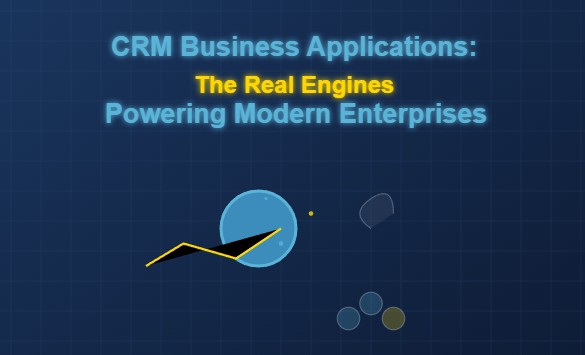In today’s hyper-connected economy, where customer expectations evolve faster than software updates, businesses are constantly searching for tools that do more than just store contact information. They need solutions that drive engagement, automate workflows, analyze behavior, and ultimately convert leads into loyal customers. That’s where CRM Business Applications step in—not as luxury add-ons, but as mission-critical components of modern business infrastructure.
Let’s explore CRM Business Applications from the inside out: what they are, why they matter, how they work, and which ones are reshaping industries from the inside.
Table of Contents
💡 What Are CRM Business Applications?
CRM Business Applications are modular, task-oriented solutions built within or on top of a CRM system to address specific business needs—ranging from marketing automation to customer service, field sales to billing operations.
These applications go beyond the traditional “CRM” (which often just means contact tracking) and extend the system into full-fledged business platforms. They’re used to manage every interaction and every transaction throughout the customer lifecycle.
Think of them as “mini operating systems” for each department—but fully integrated and customer-centered.
🚀 Core Pillars of CRM Business Applications
Modern CRM platforms like Microsoft Dynamics 365, Salesforce, Zoho, and HubSpot offer a full stack of applications, each focused on a particular business function. Here are the big guns:
1. Sales Applications
Designed to help sales teams track leads, manage pipelines, forecast revenue, and close deals.
-
Features:
-
Opportunity management
-
Sales performance dashboards
-
Automated lead scoring
-
AI-powered next best actions
-
2. Marketing Applications
Tools for building, managing, and analyzing marketing campaigns.
-
Features:
-
Email marketing automation
-
Social media integration
-
Customer segmentation
-
Campaign ROI analytics
-
3. Customer Service Applications
Optimized for handling service tickets, resolving issues, and managing customer satisfaction.
-
Features:
-
Omnichannel support (chat, email, phone)
-
Knowledge bases
-
SLAs and case routing
-
Feedback loops & CSAT tracking
-
4. Field Service Applications
Geared towards businesses with mobile service technicians.
-
Features:
-
Work order scheduling
-
Route optimization
-
Real-time technician tracking
-
Inventory management
-
5. Commerce & Billing Applications
For managing customer transactions, subscriptions, and financial flows.
-
Features:
-
Integrated payment gateways
-
Quote-to-cash workflows
-
Recurring billing & invoicing
-
Tax & compliance automation
-
🔍 Why CRM Business Applications Matter
The old idea of CRM was just a glorified address book. But in 2025, CRM is the nervous system of your entire organization.
Here’s why CRM Business Apps are non-negotiable:
✅ Unified Data = Unified Experiences
Every interaction is captured and connected—from marketing touchpoints to support tickets—giving you a 360° customer view.
✅ Automation & Efficiency
Manual tasks kill productivity. CRM apps automate routine work so humans can focus on strategy and relationships.
✅ Better Decision Making
Business applications come loaded with analytics dashboards, forecasting tools, and KPIs to guide leadership.
✅ Rapid Scalability
Need to spin up a new service center in 2 weeks? CRM apps are cloud-native and modular—scale fast, with low risk.
🧠 Real-World Applications by Industry
Let’s look at how CRM Business Applications adapt to different business verticals:
🏥 Healthcare
-
Patient relationship tracking
-
Appointment scheduling
-
Telemedicine integration
-
Insurance claims workflow
🏛️ Financial Services
-
KYC (Know Your Customer) automation
-
Risk profiling
-
Loan application workflows
-
Investment portfolio management
🛍️ Retail & eCommerce
-
Omnichannel promotions
-
Customer loyalty programs
-
Cart abandonment recovery
-
Post-purchase engagement
🏗️ Manufacturing
-
Partner relationship management
-
Order fulfillment
-
Field service scheduling
-
Product warranty tracking
🧩 How CRM Business Applications Integrate Across Your Tech Stack
Modern CRM applications are designed with API-first architectures, which means they integrate smoothly with:
-
ERP Systems (like SAP, Oracle)
-
Email Platforms (e.g., Outlook, Gmail)
-
Accounting Software (e.g., QuickBooks, Xero)
-
Collaboration Tools (e.g., Teams, Slack)
-
Data Analytics Tools (e.g., Power BI, Tableau)
This means your business apps become data amplifiers, not data silos.
🔐 Security, Compliance & Role-Based Access
Data privacy isn’t optional—it’s mission-critical.
CRM business applications come with:
-
Role-based security: Sales reps see only their accounts, managers see the full funnel.
-
Audit trails: Every action is logged.
-
GDPR & HIPAA compliance: Critical for industries like healthcare and finance.
-
Multi-factor authentication (MFA): For secured access across all modules.
🔄 Low-Code & Custom CRM Applications
One of the most powerful trends is low-code/no-code development.
Business users (non-developers) can now:
-
Build custom workflows
-
Create tailored dashboards
-
Design new business apps
-
Deploy them without writing traditional code
Tools like Microsoft Power Apps, Salesforce Lightning, and Zoho Creator let you build unique CRM extensions that fit your exact workflow—no dev team required.
📈 CRM Business Apps + AI = Intelligent CRM
Artificial Intelligence is transforming CRM into an autonomous assistant.
Here’s what AI brings to CRM applications:
-
Predictive Lead Scoring: AI ranks leads based on likelihood to convert.
-
Next Best Action: Suggestions on what to do next based on behavior.
-
Churn Prediction: Spot at-risk customers before they leave.
-
Sentiment Analysis: Analyze tone of emails or support tickets to flag angry customers.
🧱 Steps to Implement CRM Business Applications
Here’s a quick implementation roadmap:
-
Assess Needs: Map out current workflows and pain points.
-
Select a Platform: Salesforce? Dynamics? HubSpot? Choose based on use-case fit.
-
Modular Deployment: Start with one app (e.g., Sales), then expand.
-
Data Migration: Cleanse and migrate customer data.
-
Customization: Use low-code tools to adapt the apps to your operations.
-
Training & Change Management: Ensure user adoption with training programs.
-
Ongoing Optimization: Review usage, update workflows, and evolve features.
🌐 Top CRM Business Application Platforms in 2025
| Platform | Highlights |
|---|---|
| Microsoft Dynamics 365 | Deep ERP integration, Power Platform compatibility |
| Salesforce | Extensive ecosystem, AI integration via Einstein |
| HubSpot | Great for SMEs, user-friendly, fast deployment |
| Zoho CRM Plus | Affordable, high flexibility, multi-app integration |
| Freshworks CRM | Clean UI, good automation, fast onboarding |
🧠 Final Thought: CRM is No Longer Just CRM
Today’s CRM isn’t about managing relationships. It’s about managing the entire business operation with the customer at the center.
CRM Business Applications are your company’s digital muscles—they don’t just support your strategy, they become the strategy.
From automating lead flow to personalizing customer service, from field operations to AI-driven insights—these apps are shaping the most agile, data-powered, customer-centric businesses of the modern age.
Build smart. Operate lean. Adapt fast.
CRM Business Apps are not the future—they are now.
SEO-Ready Keywords: CRM Business Applications, Dynamics 365 apps, Salesforce modules, CRM for marketing, CRM automation tools, business process automation, CRM vs ERP, low-code CRM, field service CRM, AI CRM applications
Let me know if you want:
-
🔖 PDF download
-
📄 WordPress blog layout
-
📈 SEO markup (meta tags, Open Graph)
-
🧰 Custom tutorial to build CRM business apps with Power Platform or Salesforce Lightning




